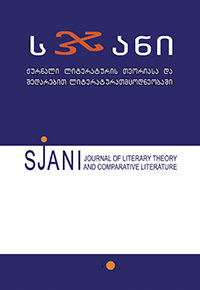ქართული ლიტერატურული რუკის ხელახალი ფორმირება, ბოლშევიზმი და ქართული ლიტერატურა
Remapping of Georgian Literature. Bolshevizm and the Georgian Literature
Author(s): Gaga LomidzeSubject(s): Archiving, Sociology of Culture, Pre-WW I & WW I (1900 -1919), WW II and following years (1940 - 1949), Theory of Literature
Published by: ლიტერატურის ინსტიტუტის გამომცემლობა
Keywords: Bolshevism; Georgian Literature; Literary Canon;
Summary/Abstract: It has been a long time since people started to talk about anti-Stalinistic paradigm or thousands of artists (and not only them), who fall victim to the ideological machine; Fates of these people have changed forever, some of them even did not survive and they were executed by the system. In some cases, artists, who survived, had to obey a new canon of the ideologized art. We think that analysis of literary processes of 1910-1940's won’t be complete until archival materials are studied thoroughly and the whole period is evaluated according to these materials.In this case all archival materials should be found and analyzed that is unknown until now. Only after this, it will be possible to answer the questions (i.e. what was the reason that provoked Stalinist repressions?) and define, what kind of phenomenon is it.This year is the anniversary of these repressions – 90 years passed since Stalinist terror.For this reason it is necessary not only statistics, but the names of executed people – who were exiled, arrested, or shot. Activities of artists (their works, attitude to the Revolution,participation in uprisings against Bolshevik or in punitive activities, etc) should be studied. Unfortunately, a considerable part of the archival documents were destroyed in 1991 during Tbilisi war and, naturally, these materials will be excluded from the analysis.‘Bolshevism and Georgian Literature’ – a book prepared by the Shota Rustaveli Institute of Georgian Literature intends to fill exactly this gap. The edition will be extremely helpful to the researchers concerned with analysis of literary and cultural processes of 1910-1940's. A Stalinist repression was one of the most ideological and tabooed issues during the Soviet period. Study of this period is getting more and more important, because system-oriented analysis of Georgian literature from the new perspective (freed from Soviet clichés) has started not long time ago. In this respect, a thorough analysis of Georgian literature of this period will be impossible without taking into account of these materials.The fundamental novelty of the book is that evaluation of the events that took place before the World War II are based on archival materials and it gives a book absolutely special value. In this book a scientific assessment of one of the most complicated and controversial period in the history of Georgian literature is represented in a political, social and cultural context and is based on less-known or unknown archival materials.Everything started in the beginning of 1920's when Georgia lost its independence and process of Sovietisation was set in motion. Tbilisi was considered one of the centers of avant-garde, but artistic experiments of Georgian artists and writers were gradually banned. People, who laid the foundation for the avant-garde in Tiflis, turned out to be in exiles and concentration camps in 1930's. Most of them were killed. Some of them managed to escape through emigration and found shelters in foreign countries. Some of survivors preferred to put up a mask of cynic philosopher (as was in Galaktion Tabidze’s case);reality became a theater or a tragic play for these writers. Works of some authors were cut and rearranged so that they took on a completely different meaning .Collective of authors in this book skillfully managed to represent the context of the period, on the one hand, and to focus on each – and what is more important, less-known– writer, on the other hand. This book represents a very important stage of the research process, because it allows us to reconstruct the complete landscape of the epoch and study Georgian modernism in a broader context. It is possible that after the thorough analysis of the works of repressed authors (as well as of ones who escaped the Soviet terror) will be possible appropriate study of Georgian modernism and avant-garde. Literary map of Georgia could be complete only through this procedure. Some less known or marginalized writers could be put in the forefront in terms of the contribution to the development of Georgian literature. But this needs a comprehensive study and it is a following step of the research process.At the same time, interesting results could be get through the censorship analysis– what kind of rhetoric caused a stir of censorship and how a text was substituted with another one; equally important results could be observed through the survey of the epoch seen from the repressed writer’s standpoint – both for taking a step back for perspective as well as research of Stalinist repressions in terms of ‘Law of the Father’ (Lacan) and study of Stalin’s ideologe me and mythologeme. It also will be useful to make a comparative study of state of repressed literature in Georgia as well as other Soviet republics and former socialist countries. Comparative analysis of these literature will facilitate to the better understanding of the tendencies –what do they have in common and what is the difference between them. Evaluation of literature and, broadly, culture of the period implies to having a clear idea of the differences and similarities between different cultures.
Journal: სჯანი
- Issue Year: 2017
- Issue No: 18
- Page Range: 343-350
- Page Count: 8
- Language: Georgian

